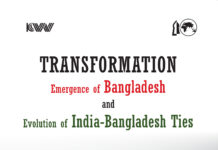Politics and diplomacy change like quicksilver! It’s all about interests. Only recently India and China were at loggerheads over a disputed piece of land in Bhutan’s Dokhlam. They were almost at war, but now the two countries have adopted one and the same stand concerning Myanmar. Myanmar is strategically treating the Rakhine state and Rohingya issue as an uprooting of ‘Islamic terrorism’. China and India have adopted the same stance.
It is common knowledge that oppression, torture and genocide was unleashed afresh after the attack by the Arakan Rohingya Salvation Army (ARSA). Observer of Myanmar affairs and journalist Larry Jagan (Myanmar’s Humanitarian Crisis) writes that Myanmar does not want to consider ARSA as an extremist or terrorist group. They want to portray ARSA as a pro-Islamic terrorist group and it is thus known in Myanmar. That is why the Myanmar government rejected the ceasefire declared by ARSA.
The prospect of ‘Islamic terrorism’ spreading is so fearful that this situation has drawn China and India together. This fear must have been felt in Bangladesh too, and prompted the government to call for a joint operation with Myanmar, after the ARSA attack. This proposal met with a volley of criticism, but it is hard to adopt a silent stand where ‘Islamic terrorism’ is concerned.
There is ample reason to consider ARSA as a nationalist organisation. But it is hard to ignore the smell of ‘Islamic terrorism’ attached to it. Then there is the history of the armed movement for an independent Islamic Republic of North Arakan in the last part of the seventies. The situation is certainly dire for Bangladesh!
In recent times another 300,000 refugees have joined the already existing 400,000. Victims of persecution, torture and genocide, they have fled into Bangladesh. Bangladesh had no alternative but to allow them to enter. But as Myanmar’s plans and policies become clearer by the day, it is also clear that sending the refuges back will be no easy matter. When such a large population of Muslims are progressively faced with oppression and torture and are driven from their homes, how can we be certain that they will not be vulnerable to terrorism and Islamic militancy, particularly given the prevailing global circumstances? As it is we are faced with the dangers of Islamic militancy within the country.
India and China are both vying to establish their influence over the other countries of the region. It is unfortunate that Bangladesh does not have the support of these two countries on the Rohingya issue. Till now, China and India feel that Myanmar’s Rohingya policy suits their interests. However, several observers feel that rather than Islamic terrorism, the actual crux of the matter is economic interests, investment and geo-political equations.
China has the most investment in Myanmar. Over the past 30 years, China’s investment in Myanmar has totalled US$ 18 billion. The investment of all the Western countries combined does not even come close to this. Indian investment is not much as yet, but all initiative and efforts are being taken to increase this. India is constructing a deep-sea port in the Rakhine state. It also has plans to construct a road from Mizoram, though Myanmar, up to Thailand. India is well aware of the importance of improving relations for economic and strategic relations with Myanmar, given Myanmar’s rich energy, mineral and forest resources, as well as its close ties with China.
While hundreds of thousands of Rohingyas were fleeing the persecution, oppression and genocide in their country, Indian prime minister Narendra Modi paid a visit to Myanmar last week. He made it clear in the joint statement at the end of the visit that India and Myanmar were on the same page regarding the Rohingya issue. Modi said nothing about the torture and oppression of the Rohingya or their taking up shelter in Bangladesh.
The Global Times, considered to be China’s mouthpiece in the international arena, carried an editorial entitled ‘Is Suu Kyi to blame for Rakhine violence?’ It is clear that they do not want to blame Suu Kyi. On the contrary, they strongly castigated the Western countries for criticising Suu Kyi. The editorial stated: ‘It is a humanitarian disaster that hundreds of thousands of Muslims in Rakhine fled to Bangladesh. But avoiding such a disaster is actually harder than Western critics consider, given Myanmar’s reality.’
China has its own problems with the Uighur Muslims and perhaps that is why they are so apprehensive about the ‘Muslim’ Rohingya community. In an article of the Global Times, an analyst responded to Nobel peace prize winner Malala Yusufzai’s criticism of Suu Kyi. In the article ‘Malala has a lot to learn before hitting out at Suu Kyi’, Liu Lulu wrote that Malala is clueless about the significance of Myanmar’s strikes against extremists. She should learn more about the situation in Myanmar, and her criticism against Suu Kyi is inappropriate. The article reminded Malala she won the Nobel peace prize for her own strong stand against the Talibans.
Given the position of China and India on the Rohingya issue, it can be said that Myanmar is in a very advantageous position. Many feel that it has been a diplomatic failure on the part of Bangladesh not to have gained support from two close friends like China and India on the Rohingya issue. But the bottom line of diplomacy of all countries is protecting their own interests. If going with Myanmar suits the interests of China and India, nothing will bring them to Bangladesh’s side.
But then again, diplomatic success lies in continued efforts. No situation or reality remains static. China and India may not want to put pressure on Myanmar at the moment, given their own interests. However, Bangladesh must make it clear that Myanmar’s Arakan or Rohingya policy will inevitably spark off further unrest in the region. No one will remain immune to the danger. In the end, the economic equations may not add up so easily.
Source: Prothom Alo









